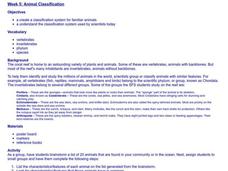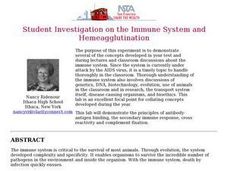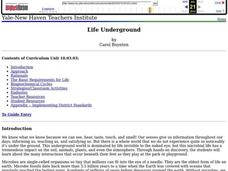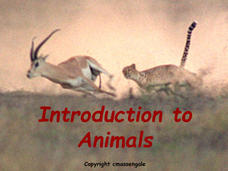Curated OER
Underneath the Microscope
Eighth graders enhance their skills in operating a microscope. They become comfortable with the vocabulary associated with microscopes and investigate how to place slides and focus them properly using the microscope. Students are given...
Curated OER
What Do Genes Look Like?
Seventh graders describe the basic structure of the DNA molecule. They identify what an inherited trait is and how it can be determined by one or more genes. Finally, 7th graders identify that plant and animal cells contain several...
Curated OER
The Bottom Line
Seventh graders assume the role of stockholders in a fictitious biotech company. After investigating the cloning of pets, the effects of cloning on the health and well being of the cloned animal, and the ethical issues involved, groups...
Curated OER
Vocab Chapter Seven: Transport
A note-taking resource for the topic of transport between cells. If formatting is important to you, there are some slight changes you'll need to make to this Word document to make it consistent.
Curated OER
Animal Classification
Students list characteristics and features of animals found in their community. They then group the animals according to how they are similar and different and create names for each group. They then create a chart of their...
NOAA
Individual Species in the Deep Sea
A tube worm's outer covering is made of chitin, the same material that makes up the shells of lobsters and crabs. Scholars create tube worms and analyze and discuss the longevity of organisms living near cold seeps. They then discuss and...
Rice University
Biology for AP® Courses
An eight-unit electronic textbook provides a guide to AP® Biology. Each of the 28 chapters include an introduction, multiple lessons, a summary, review questions, and test prep questions. Teachers see how each lesson connects to a big...
Curated OER
Invertebrate Classification
Students discuss the recent disovery of the "furry lobster" to peak interest in the animal kingdom. They classify various speciments using invertebrate dichotomous keys, identifying major animal phyla and classes. Thy the complete the...
Curated OER
Creatures of the Ocean
Second graders examine the characteristics of a specific ocean creature. In pairs, 2nd graders create a graphic organizer to list categories and supporting details of the ocean creature. Students review data and use it to write a report...
Curated OER
Cellular Invaders
In this biology worksheet, students study the animation on how the body's defense mechanism fight microbes. They write short answers to 8 questions that follow.
Curated OER
Controlling the Code: Molecules at Word
Students investigate how cells determine which genes will be expressed and which will be silent. In this genetics lesson, students use on-line resources to complete a worksheet and gather information about gene regulation. Lesson...
Curated OER
Biology: Sun, Skin and Cancer
Students identify basic components of skin on a cross sectional diagram. They provide a basic description of cancer in terms of cell biology. Students explore the ABCD of skin cancer/mole evaluation and perform their own evaluation of...
Curated OER
Student Investigation on the Immune System and Hemeagglutination
Students perform an experiment to demonstrate the principles of antibody-antigen binding, the secondary immune response, cross reactivity, and complement fixation. The materials to be used include antibodies from a rabbit that was...
Curated OER
DNA Extraction Lab
Students extract DNA and test for its presence from unroasted (raw) wheat germ using a prescribed procedure. They modify the procedure to provide a less expensive, easier method. They also extract DNA from different available plant,...
Curated OER
(Clues to) Copying the Codes: Examining the Evidence
Students view animations of DNA replication and transcription and complete a worksheet. In this genetics lesson, after watching on-line video clips to gather information about DNA replication and transcription, student teams identify...
Curated OER
I See a Coyote
Learners role-play coyotes looking for natural resources. In this natural resources lesson, students examine the relationship between animal life and the environment. Learners play a game that demonstrates how natural...
Curated OER
Life Underground
First graders build a terrarium in order to observe animal and plant life dynamics. In this biology lesson, 1st graders compare how organisms survive in different environments. They write their observations and analysis in their journal.
Biology Junction
Introduction to Animals
Out of all animals, elephants alone lack the ability to jump. Scholars learn all about animals using a presentation full of fun examples. It describes different types of animals, the biological similarities and differences between...
Apple
GarageBand
Imagine there's a recording studio on your smart phone or tablet. Its easy if you try this tool. Imagine all the instruments you can play. Imagine there's no charge. You may say it's a dream, but you can join this band with just a touch.
Curated OER
Teaching About Plate Tectonics and Faulting Using Foam Models
Young scientists learn about plate tectonics and the three different types of faults (normal, reverse, and strike-slip) using foam models. The activity also covers common types of locations where these faults are found.
Kids Discover
Ancient Egypt by KIDS DISCOVER
Discover Ancient Egypt! Learn about mummification and gods, visit pyramids and temples, examine cliff carvings and paintings, take quizzes and engage in activities. Colorful, interactive, and easy to use, this app is not just for kids!
Howard Hughes Medical Institute
BCR-ABL: Cancer Protein Structure and Function
How do scientists discover treatments for cancer? A presentation and accompanying worksheet explain how one cancer spreads and a theory of how to stop it. It details the trials and relapses after using the medication. Scholars learn...
ESL Kid Stuff
Prepositions of Location
Over, under, beside. Language learners practice using prepositions of location to answer the question, "Where is . . ."
Cold Spring Harbor Laboratory
DNA Words Are Three Letters Long
DNA writes 64 different words but only codes for 20 different amino acids. Budding scientists learn about where each of these numbers come from and why they aren't equal with an online interactive. The resource explains the research, the...
Other popular searches
- Plant and Animal Cells
- 3d Animal Cell
- Animal Cell Structure
- Animal Cell Organelles
- Plant vs. Animal Cells
- Animal Cell Parts
- Animal Cell Label
- Animal Cell Diagram Blank
- Animal Cell Diagram
- Animal Cell Model
- Building an Animal Cells
- The Animal Cell

























